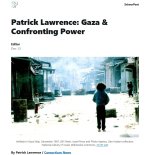
The US military has occupied Syrian sovereign territory since 2014, preventing Damascus from accessing its own oil and wheat fields.
A top Pentagon official has acknowledged that Washington’s strategy is to
starve Syria’s central government of revenue it needs to rebuild, after a decade of war fueled by foreign powers devastated the country.
Former US President Donald Trump boasted in 2020: “They say, ‘He left troops in Syria’. You know what I did?
I left troops to take the oil. I took the oil. The only troops I have are taking the oil. They’re protecting the oil. I took over the oil”.
The United States has at least 900 troops in Syria. Syria’s internationally recognized government has repeatedly called for them to leave, meaning the US military presence is illegal according to international law.
US Senate votes 13-84 against withdrawing troops from Syria
This issue has come up in Congress several times in recent years.
On
December 7, the
Senate voted 13-84, rejecting a resolution to withdraw the US troops.
The joint resolution,
S.J.Res.51, “direct[ed] the removal of United States Armed Forces from hostilities in Syria that have not been authorized by Congress”.
Of the 100 members of the Senate, which is roughly evenly split between both parties, seven Democrats voted for the resolution, along with one left-wing independent who caucuses with the Democrats (Bernie Sanders) and five Republicans.
The senators who voted to withdraw US troops from Syria were the following:
Democrats (7)
- Dick Durbin (Illinois)
- Ed Markey (Massachusetts)
- Jeff Merkley (Oregon)
- Chris Murphy (Connecticut)
- Elizabeth Warren (Massachusetts)
- Peter Welch (Vermont)
- Ron Wyden (Oregon)
Independent (1)
Republicans (5)
- Mike Braun (Indiana)
- Mike Lee (Utah)
- Rand Paul (Kentucky)
- Tommy Tuberville (Alabama)
- JD Vance (Ohio)
The resolution had been introduced by Rand Paul, a libertarian-leaning Republican senator from Kentucky.
The proposed legislation noted that US military forces have been active in Syria since September 22, 2014.
Since 2016, the resolution disclosed, US troops in Syria have attacked the Syrian government and its allies, including Iranian and Russian fighters, at least 11 times.
Both the Donald Trump and Joe Biden administrations repeatedly launched airstrikes in Syria against government and allied forces.
US occupies Syria’s oil fields
In March 2023, a senior United Nations official, Farhan Haq, inspired controversy when he
falsely claimed “there’s no US armed forces inside of Syria”. (Chinese reporter Edward Xu corrected Haq’s lie, while calling out the UN’s hypocrisy on Ukraine.)
The US corporate media was once quite open about this fact.
Back in 2018,
neoconservative Washington Post columnist Josh Rogin bragged, “In Syria, we ‘took the oil’”. He emphasized that “the United States and its partners control almost all of the oil” in the country.
Then President Trump had claimed at the time that he wanted to withdraw US troops from Syria, but Rogin complained that, “if the United States leaves, that oil will likely fall into the hands of Iran”.
Trump listened to hawkish critics like Rogin and decided to backtrack, instead leaving the US troops – who remain there today.
NPR stated clearly in 2020, “U.S. forces in northeastern Syria have a relatively new mission:
securing oil fields not only from ISIS, but also from Syrian government and Russian forces”.
Trump sat down for an
interview with Fox News host Laura Ingraham that same year. The US president explained:
In 2019, a neoconservative US government official overseeing Syria policy, Dana Stroul, boasted that “one-third of Syrian territory was owned via the US military, with its local partner the Syrian Democratic Forces”, or SDF.
The Kurdish-majority SDF have acted as a US proxy, using oil revenue to fund their separatist operations, destabilizing Syria’s central government.
As
Geopolitical Economy Report editor Ben Norton wrote at the time, Stroul emphasized that this Syrian land “owned” by Washington was “resource-rich” and constituted the “economic powerhouse of Syria, so where the hydrocarbons are… as well as the agricultural powerhouse”, with many wheat fields.
When Biden entered office in 2021, his administration appointed
Stroul as deputy assistant secretary of defense for the Middle East, the top Pentagon official crafting US policy for West Asia.
US continues to militarily occupy Iraq as well
The United States had roughly
40,000 troops stationed in West Asia (known popularly as the Middle East), as of October 2023.
In addition to the 900 in Syria, the US has 2500 troops deployed to Iraq, where their presence also violates the country’s sovereignty and international law.
On January 3, 2020, US President Trump ordered a drone strike that assassinated top Iranian General Qasem Soleimani, along with a major Iraqi commander, Abu Mahdi al-Muhandis.
In response to Trump’s blatant act of war on its soil, Iraq’s democratically elected parliament voted in January 2020 to
expel the US troops occupying the country.
Trump ignored the Iraqi parliament’s vote, instead threatening to impose sanctions on Baghdad.
Biden, a Democrat, has continued his Republican predecessor’s policy, prolonging the military occupation of both Iraq and Syria, in flagrant violation of the nations’ sovereignty.
The war in Gaza that broke out in October has also spilled over to other countries in the region.
In addition to
indiscriminately killing Palestinian civilians, including thousands of children, in
one of the most brutal bombing campaigns in history, Israel has also attacked Lebanon, and even bombed infrastructure in Syria, such as
airports in Damascus and Aleppo.
This has led resistance forces in Syria and Iraq to launch attacks on the US troops illegally occupying their countries. The Biden administration responded with air strikes against these fighters.
According to the Pentagon, US troops in the region were attacked at least 52 times from October 17 to November 13.








